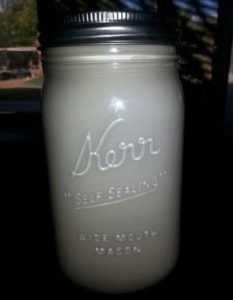Reduce compost odors and keep it hot by using beneficial microbes that break down odor-causing ammonia and hydrogen sulfide. Commercial applications of beneficial microbes, also known by the trademarked term Effective Microbes (EMs), can be purchased in liquid or granular form. EMs are useful, but they can be pricey. One of the main ingredients is lactic acid bacteria, which is easy to propagate at home. In fact, if you have ever had a gallon of spoiled milk in the fridge, you have already been successful at growing the bacteria. You can take this a step further to create beneficial bacteria for composting.
beneficial microbes that break down odor-causing ammonia and hydrogen sulfide. Commercial applications of beneficial microbes, also known by the trademarked term Effective Microbes (EMs), can be purchased in liquid or granular form. EMs are useful, but they can be pricey. One of the main ingredients is lactic acid bacteria, which is easy to propagate at home. In fact, if you have ever had a gallon of spoiled milk in the fridge, you have already been successful at growing the bacteria. You can take this a step further to create beneficial bacteria for composting.
Homegrown Beneficial Bacteria
Pour 1 quart of milk in a glass jar and screw the lid on loosely. Store the milk in a dark cabinet until a curd forms on top of the liquid.
Remove the curd and add one tablespoon of black-strap molasses to the liquid. The mixture can be stored in the refrigerator for up to one year.
To activate, mix one part liquid to 20 parts non-chlorinated, room temperature water. Spray or pour the mixture onto composting materials and turn in with a garden fork. I also use the mixture to spray the ground in livestock pens. The microbes go to work quickly, reducing urine odors that grow in warm, wet areas.
Read more detailed information and instructions for making your own Effective Microbe Inoculant on the Hawaii Healing Tree website here.

